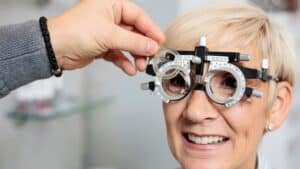Month: November 2023
A Widow’s Decision: Better or Bitter?

Recently, a young widow shared something that stuck with me; a point she heard made by Rick Warren, a well-known pastor, author, and host of a Daily Hope Radio show. I don’t know if he was talking about grief specifically or moving forward in life in general. But he suggested that life can force you to decide how you choose to move forward, feeling better or feeling bitter about your circumstances.
Choosing Your Path
It sounds so easy to choose and to say it, but to live it every day can be another matter. Especially in situations where there has been a traumatic, life-changing event that has taken place, like losing a spouse. No matter what the relationship was like, you become a single person with a path forward that needs to be recreated. It’s not something we get “over,” but it’s something we get “through.”
Widowed Sisters
When we realize that 80% of married women lose a spouse, we begin to notice those around us and eventually realize that will most likely be us someday, if not already. I like this term I learned from The Modern Widow’s Club – they call each other “wisters” (widowed sisters). I love the connotation of that, sisters embracing and supporting each other. Even before we are widowed, we can nurture that sister-like relationship with girlfriends.
Better Relationships
Perhaps that is one way we can choose “better” as a way forward on our path in life, whether we are officially “wisters” or not. Better doesn’t mean better than before, it means better than you are feeling right now.
Relationships have a profound impact on our health and happiness. So, investing our time, care, and concern in each other is rewarding in so many ways now and in the future. I’ve seen many groups of older women out together for lunch, dinner, or some social event. I always smile and assume they are “wisters” but maybe they are wise women who value and devote time to friendship now.
Better Gratitude
Another way to choose “better” instead of bitter if we find ourselves alone, might be to reflect on our gratitude for the positive memories that were made (and think less often about any negative memories). One recent widow I visited with shared how her friend commented that the two of them were “princesses” and now realizing how grateful they were for that.
Both of their recent husbands had spoiled them like “princesses” by taking care of all yard, auto, and household fix-it chores. I am in that same boat and so appreciate that princess role! It’s such an adjustment when all of that falls on your shoulders as a single person.
Better Prepared
One additional way to choose a “better” way forward is to think about all you have been through on the financial side of this transition to singlehood. It was likely very stressful and time-consuming. So why not take care of making that next journey of where the assets go as seamless as possible for your family?
Why? Because you love your family and one of the best gifts you can give them is getting your financial house in order (you may want to consider using my Suddenly Single bundle of checklists) for clarity, organization, and current titles, beneficiaries, and estate planning documents.
A middle-aged couple I know had pleaded with their parents over the past two years to put estate planning documents in place and review asset titles/beneficiaries so that whatever they wanted to happen would be assured.
Too often in life, we procrastinate things, especially when they are related to unpleasant thoughts like incapacity and dying. The parents in this situation were no exception, so when one passed away unexpectedly earlier this year and within months the other parent needed Memory Care, the out-of-state adult children were left scrambling to work with an estate planning attorney to provide everything that wasn’t in place but now needed.
Love Them to the End
Even free resources that help you think through your wishes, summarize your home information, and break down your next steps on a calendar can be so helpful. You will feel better knowing that your family will do better during a stressful time because you prepared for that inevitable time in advance. Leave them feeling loved, all the way to the end. Won’t that feel “better” for everyone involved?
Let’s Have a Conversation:
How can we choose “better” after a loss in our lives? What helped you if you have already experienced widowhood? Let’s have a conversation!
Read More
The 4 Doctor’s Visits You Shouldn’t Miss

Visiting the doctor. It’s one of the most important things you should do, but also one of the easiest things to put off. However, as you get older the temptation to conveniently forget about doctors’ appointments becomes stronger.
Whatever the reasoning behind putting off an appointment – whether it be due to concerns around what your doctor will find, or financial-related worries – missing doctors’ appointments will only make the situation worse.
With that being said, as we age, we’d rather not play out the stereotype of being a regular in the doctor’s lounge. That’s why I’d like to share what I believe to be four of the most important doctor visits that you shouldn’t miss.
Make sure that you’re prepared for these visits and, together with regular attendance, you’ll be able to continue enjoying your life, without putting your health at jeopardy.
General Medical Check-Ups
It’s really important to ensure that you’re regularly having a general medical check-up. Of course, what defines regular will depend on a few different factors, including:
- Your age
- Your overall general health
- Any pre-existing conditions that you may have.
As a general rule, though, I would advise going for a general medical check-up at least once a year. This is the best way to prevent, or stem the curb of, any future health issues.
During a general medical check-up, your doctor will check things like your heart, lungs, weight, cholesterol levels, blood pressure, and other vital signs.
General medical check-ups also provide the perfect opportunity to ask your doctor about any queries or concerns that you may have. Attending regularly will help to ensure that you cut down the amount of any future unplanned visits.
Regular Gynaecology Visits
While regular visits to your gynaecologist may feel like something that becomes less important as you pass 60, this is not the case. The female body goes through a number of changes throughout the years, especially in the post-menopause phase.
This makes regularly visiting your gynaecologist really important, as tests like a pelvic exam, Pap smear, and human papillomavirus (HPV), can all help in the early detection of cancer.
Depending on your individual situation, your doctor may recommend having a Pap smear test around once every three years, and an HPV test every five years. However, this will vary for everyone. In some cases – usually following a few negative Pap smears in a row – your doctor may feel that they are no longer needed.
Visits to your gynaecologist are also important to ensure that you’re having regularly scheduled mammograms. Breast cancer is, unfortunately, common. This is especially true for women over 60. Early detection when it comes to breast cancer plays a vital role in recovery rates.
Regrettably though, regular access to a gynaecologist is something that’s financially out of reach for many women over 60, especially if you don’t have health insurance. This can cause missed detections and the need for further treatment.
If you find yourself in this position, don’t despair. Alternative options are available if you look elsewhere.
For example, an increasing number of women have been travelling abroad for treatment in recent years. Don’t let the myths of medical travel steer you away from this option. Travelling overseas for treatment has allowed hundreds of patients to access high-quality care, at a fraction of the cost that they’d pay at home.
Visiting Your Ophthalmologist
Nothing quite lives up to the stereotype of ageing more than struggling with eyesight. I understand that feeling and the negative connotations associated with having to get reading glasses for the first time in your life.
However, regular visits to your ophthalmologist are really important, especially as you get older. The American Academy of Ophthalmology recommends that those aged 65 and older should have an eye examination “every 1 to 2 years, even in the absence of symptoms.”
The mention of an absence of symptoms is important here. Even those luckily enough to still have 20/20 vision after they turn 60, should be organising regular visits to their ophthalmologist. These will help to catch undetected cases of ocular disease, which occur more regularly with age.
Dermatology Is Important
Dermatology isn’t just about beauty products and silky smooth skin. In fact, dermatologists can play a pivotal role in the early detection of cancer. This is backed up by the American Academy of Dermatology (AAD) who conducted a study into melanoma detection and survival rates.
They found that the five-year survival rate amongst patients whose skin cancer was detected and treated early was 99%. However, they also found that the five-year survival rate dropped to 23% amongst those whose cancer was not detected and treated in its early stages.
None of us like to think about cancer and the prospect of having to face it. However, this study from the AAD highlights the importance of regular visits to your dermatologist.
Prevention, Prevention, Prevention
As I mentioned at the beginning of this article, as a doctor I understand the worry about checking in on your health. But that is exactly why these regular visits are so important.
By going regularly, you will help to avoid more frequent visits in the future. For women over 60, it’s all about prevention, and not missing these four doctors’ visits will help to do exactly that.
Let’s Have a Conversation:
How often do you visit your doctor as a preventative measure? Which of these visits have you put off more than once? Has a scheduled doctor’s appointment revealed something you never even suspected was going on in your body? Please share your story and let’s have a conversation.
Read More
Recent Posts
- Batch Cooking & Freezing for Later: Tips for Easy Meals When You Don’t Feel Like Cooking
- Madison LeCroys Black Keyhole Long Sleeve Mini Dress
- Ciara Miller’s Burgundy Mesh Feather Top
- Amanda Batula’s Red Striped Sweater and Cat Eye Sunglasses
- Important Cybersecurity Reminders for 2026 – How to Spot and Avoid Common Scams
Archives
- February 2026
- January 2026
- December 2025
- November 2025
- October 2025
- September 2025
- August 2025
- July 2025
- June 2025
- May 2025
- April 2025
- March 2025
- February 2025
- January 2025
- December 2024
- November 2024
- October 2024
- September 2024
- August 2024
- July 2024
- June 2024
- May 2024
- April 2024
- March 2024
- February 2024
- January 2024
- December 2023
- November 2023
- October 2023
- September 2023
- August 2023
- July 2023
- June 2023
- May 2023
- April 2023
- March 2023
- February 2023
- January 2023
- December 2022
- November 2022
- October 2022
- September 2022
- August 2022
- July 2022
- December 2021
- November 2021
- October 2021
- September 2021
- August 2021
- July 2021
- June 2021
- May 2021
- April 2021
- March 2021
- February 2021
- January 2021
- December 2020
- July 2020
- June 2020
- May 2020
- April 2020
- March 2020
- February 2020
- April 2015
- January 2015


